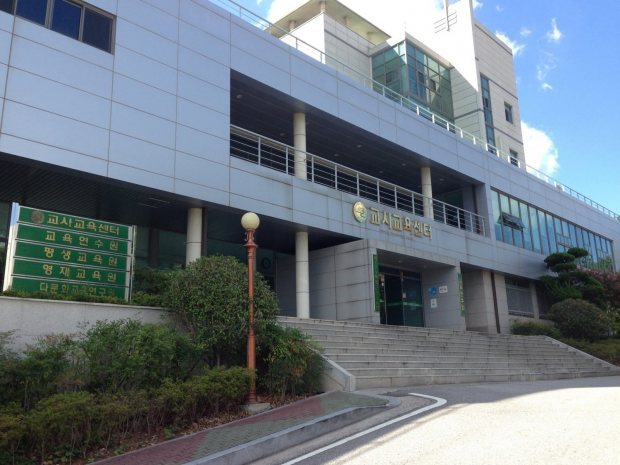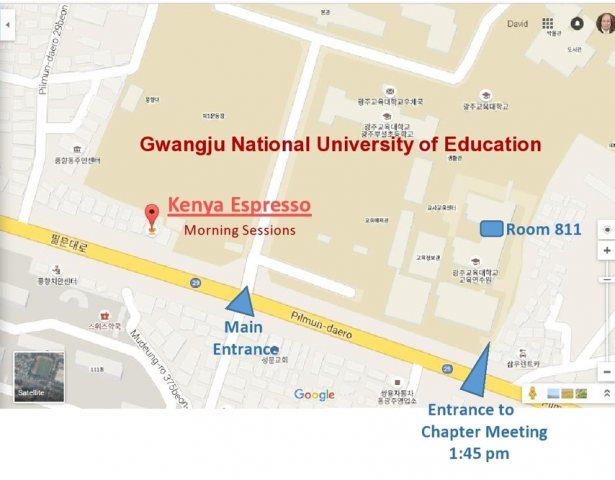
Gwangju-Jeonnam Chapter August Meeting
.
––– Morning Korean Help Cafe –––
New Time: 10:00 - 10:50 am (Sat., Aug. 13). Late arrivals are still welcome.
Location: Kenya Espresso Cafe, near GNUE. (The 2nd building from GNUE main gate, towards E-mart. Map at bottom.)
Bring your questions about the Korean language.
Target group: High-Beginner to Low-Intermediate.
David Shaffer at the Help Table. Casual format.
––– Morning Reflective Practice Session –––
Time: 11:00 am - 12:30 pm (Sat., Aug 13)
Location: Kenya Espresso Cafe, near GNUE. (The 2nd building from GNUE main gate, towards E-mart. Map at bottom.)
Topic: Are You in Control of Your Classroom?
Facilitator: Jocelyn Wright
––– MAIN MEETING SCHEDULE –––
Time: Saturday, August 13, 2016, 1:45 - 5:00 pm
Location: Gwangju National University of Education (GNUE), Teacher Training Center (교사교육센터) 1st Floor; Room 811. Detailed directions HERE.
1:45 pm: Sign-in and Meet-and-Greet (Admission is free. Future membership is welcomed.)
2:00 - 2:50 pm: Presentation
Understand the Player: Gamification and Activity Design
Zon Petilla (Ojeong English Center, Gwangju)
2:50 - 3:10 pm: Refreshment Break
3:10 - 4:25 pm: Collaborative Problem-Solving Workshop
Real Solutions to Real Problems in the ELT Profession
David Shaffer facilitating
4:30 - 4:45 pm: Swap-Shop Presentations
Share your Teaching Ideas, Classroom Activities, and Teaching Wisdom with the group.
(Everyone is encouraged to share. Short tidbits are welcomed. Handouts also welcomed.)
4:45 - 5:00 pm: Announcements / Drawing for Door Prizes / Closing
––– After-meeting dinner at The First Alleyway, downtown –––
Presentation Summaries and Presenter Bio-sketches
.
Understand the Player: Gamification and Activity Design
Zon Petilla
Research on how video games can be implemented to help students learn in and out of class is relatively new and the methodologies are varied. It can be said that games have had an effect on humanity since the creation of dice. Before computers, games as much as narratives have for centuries taught us about how to socialize and survive in the world we live in. Gamification is the process whereby game-related theories and practices are used to help people attain new skills, confidence, and self-autonomy. Gamers are able to attain new life skills more easily with games than without. Games have been shown to help students become autonomous learners as well as gain the necessary skills to thrive in a technology-integrated world - skills such as collaboration across networks, leading by influence, driving curiosity with imagination, accessing while analyzing information, and using effective language communication, just to mention a few examples.
Currently, the lack of research and understanding on how elements of gamification or game design can be used in the classroom has lead teachers and students to miss learning opportunities or to not use gamification properly. Examples include poor game balancing, causing students to not want to play by creating unfair or broken game conditions. Skinner Box-type rewards often don’t consider the course content or student progression through a curriculum. This presentation will cover relevant research that has been conducted and present ways to incorporate game design into one of the common NET and EFL teaching lesson plan frameworks.
The Presenter
Between California and South Korea, Zon Petilla has been teaching multiple levels in his 9-year career as an educator. He has a BA in linguistics (TESOL) from CSU Fresno and an MSBE from Full Sail University of Florida. Zon's past presentations have included "Visual Language Primitives" at the San Comic-Con International in 2007 and "Simplifying Class Rules" at the KOTESOL National Conference this spring. Currently, he teaches students from grades K-6 at the Ojeong English Center. He is also an amateur HTML5 game developer.
___________________
Collaborative Problem-Solving Workshop
Real Solutions to Real Problems in the ELT Profession
David Shaffer, Coordinator
This workshop will feature five "problem stations," each with a different problem that a chapter member is facing and cannot find a satisfactory solution to, as well as the member with the problem. Attendees will divide up and go at the “problem stations” of their choice. Each small group will discuss the problem, ask questions of the problem-holder, and offer suggestions to help the problem-holder arrive at a suitable solution.
When finished at their present station, attendees to go to the next "problem station" of their choice, where they will form a new small group to discuss a new problem to find a solution to. We hope that each attendee will be able to participate in three small-group discussions of problems (four, if time permits) during the workshop. The workshop will conclude with each problem station host informing the entire group of the solution they found, through the small-group discussions, to best deal with their problem.
The problems to be discussed and solved include the following:
Problem 1. Making Discipline-Specific Concepts in Content-Based Courses Comprehensible Without Coursebooks
— Problem Station Host: Jocelyn Wright
I teach content classes in English. The best textbooks available on the topics are not intended for EFL students and tend to be long and conceptually challenging. Moreover, they are often expensive and/or have to be imported. As such, it is impossible to require students to buy them.
The class which I find has the most challenging content is Interpersonal Communication. The teaching method I use combines in-class lecture and application/discussion activities. To prevent rote memorization, students are not given the PowerPoint slides, but encouraged to take personalized notes, which they do more or less well with the help of the note-taking workshop given at the beginning of the semester. As support, publisher outlines and glossaries of textbook materials are made available to students at the beginning of the semester. However, before exams, students often complain that these are too difficult to understand. I'm short of time to rewrite a textbook – what more can/should I do?
________
Problem 2. Students’ Lack of Adequate Vocabulary and Expressions to Express Themselves Fully
— Problem Station Host: Jessica Magnusson
The problem that we will be discussing is students’ lack of vocabulary and expressions. Vocabulary is a huge issue for language learners. The words that students in Korea have been required to memorize for tests are often forgotten soon after the tests, or remembered passively leaving students able to recognize and understand words but still not able to use them actively. There are many students who are willing to express themselves, only to find that they are unable to adequately say what they want to say. Not knowing, or not remembering, the right words and expressions for a given situation can lead to a lack of confidence in a foreign language. I will share the frustrations that I have had in trying to help students build up their store of knowledge of vocabulary and expressions. I look forward to the discussion and the sharing of ideas regarding vocabulary-building.
________
Problems 3: How to Teach Reading Comprehension Effectively with Authentic Materials
— Problem Station Host: Jeongsoon Park
My students hate to do English readings in their textbook, so I always prepare texts for reading that are short, readings of different genre: science topics from educational English newspapers, poems, pop songs, and text from novels. These are for fun and for interest. Sometimes they are a strong motivating factor for many students, but they are not sufficient for improving the students' reading comprehension skills. My students are elementary school 5th- and 6th-graders, and middle school 1st and 2nd year. I think that they need to experience deeper thought through reading – the classics and philosophical thought. I would like to have suggestions on how I can improve reading comprehension for my students by effectively using authentic materials.
_________
Problem 4. How to Introduce Culture into a Lesson in a Meaningful and Useful Way?
— Problem Station Host: Cara Scott
Many believe language and culture to be strongly related. H. D. Brown writes, "One cannot separate the two without losing the significance of either language or culture. The aquisition of a second language, except for specialized, instrumental aquisition..., is also the aquisition of a second culture."
Do you consider culture to be relevant in the ESL classroom? How can we introduce culture to students in a meaningful, useful context? I have tried, but my attempts seem to be less than satisfactory – for me as well as for the students.
________
Problem 5. Unreliable Attendance
— Problem Station Host: Bryan Hale
A problem I have faced in different teaching contexts in Korea is unreliable attendance – students missing lessons or arriving late (or sometimes needing to leave early), often in fairly unpredictable patterns. In some cases, this has applied to most students in the class. Often, it just isn't possible for students to attend more consistently, but I still need to teach them as well as I can.
This situation creates several challenges: How can I include late-arriving students without disrupting the students who have already started tasks? How can I keep tasks worthwhile and challenging while also making them accessible to students who won't be present for instructions at the beginning of the lesson, or who may not have been to previous lessons? How can I manage group dynamics? How can I maintain a sense of class purpose and achievement?
__________________________________________________
Photo: The Gwangju National University of Education (GNUE / 광주교육대학교), Teacher Training Center (교사교육센터), venue for our main meeting - 1st floor, Room 811.




